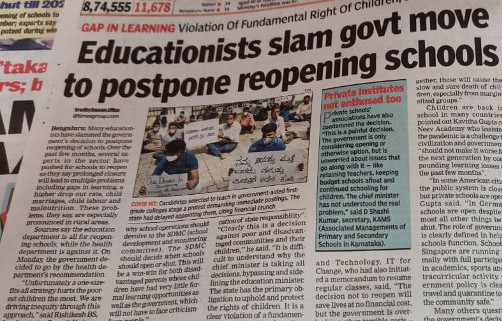Oct 2020
Statement Issued by a Group of Educationists and Social Work Organizations
Concerns
- Between lock-downs and relaxations, governments are trying to find the right balance between saving lives and keeping the economy going. A similar balance is essential in education as well. A very small percentage of students are able to connect to online education, most are not, owing to lack of infrastructure, electricity, devices or connectivity. The majority are suffering severe ‘learning loss’, due to being out of school for several months, with severe long term negative impact. This detrimental impact is higher on the children from marginalized groups, where family support is lesser, owing to higher survival pressures due to the Covid-19 pandemic.
- Apart from learning, the school is an important site for many other aspects of education, including nutrition and health. The lock-down of schools has deprived children of nutritious mid-day meals. India already has a high malnutrition status, with unacceptably high levels of stunting and wasting, and the continued deprivation of mid-day meals will aggravate this harm. Providing dry rations occasionally to the family will not mitigate this harm, as the volume of such support is both much lesser and meant for the family, which will reduce its availability to the child.
- The school is a place for safety and security of the child. Research alerts that early marriages are becoming more common post the pandemic. Early marriages are associated with dis-empowerment of girls and early child bearing will wreak further havoc on their health as well as health of their children. In the absence of school, more children are being pushed into child labor. Early marriage, child labor and malnutrition will contribute to students further dropping out of school. Children being forced to drop out of schools violates their right to free and compulsory education, which is a blot on our society.
Requests
- Hence, it is absolutely essential that the complete school lock-down be reversed. This does NOT mean all schools have to open and go back to the pre-pandemic normal. School opening needs to be phased, different classes/sections can be open on different days, school timings can be limited and staggered. These measures can keep the number of students in the school at levels that allow for physical distancing. Water, soap, sanitizers, thermal sensors, masks must be provided to schools in adequate quantities, by the government, along with support from the local health centres, to allow for a hygienic environment. This is a necessary investment to keep our children safe. Even 2 days a week with limited hours of schooling is a huge improvement over not having school at all, or having some version of online education.
- In-spite of all precautions, it is possible that positive cases may be detected. Quarantining, school closure for limited period etc. will need to be done. It is best to decentralize such decisions to the taluka or gram panchayat level, to allow greater flexibility and responsiveness. A similar ward-level approach in Bengaluru is showing benefits. The current ‘keep all schools closed’ is a centralized, ‘one-size-fits-all’ decision, which needs an urgent re-look. Phased and gradual school reopening, as well as the resumption of Vidyagama, (the program initiated by the Government of Karnataka), in a voluntary and decentralized manner is immediately needed. Anything else would compound the harm we are inflicting on children, especially those from the marginalized groups.
Endorsed by:
- B.T. Venkatesh, Renowned Human Rights Activist and Research Lawyer
- Niranjanaradhya.V.P., Senior Fellow, Centre for Child and the Law, NLSIU
- Rishikesh, Azim Premji University
- Amman Madan, Azim Premji University
- Y.J. Rajendra, PUCL Karnataka
- Moyyuddin Kutti, President, School Development and Monitoring Committee Coordination Forum
- B.Sripada Bhat, Samana Shikshanakkagi Janandolan
- Reshma, Action Aid , Bengaluru
- Dr. Sylvia Karpagam Public Health Doctor and Researcher
- Sarovara, Karnataka Vidyarthi Shakti
- Shankar Halagatti, Former Chairperson, Bala Academy, Dharwad.
- Nagesh Aralakuppe, Karnataka Vichara Vedike
- Ananda, Banavasi Balaga
- Dr. Srinivasa Kakkilaya, M.D.,Medical Expert, Mangalore
- Dileep Kamath, Senior Activist, Belgaum
- Dr.Vasundhara Bupathi, Renowned Writer and Chairperson, U. Bhupati Memorial Trust
- Sriranjani Ranganathan, Foundation for Education, Ecology and Livelihood
- Gurumurthy Kasinathan, IT for Change
References
- https://www.livemint.com/news/business-of-life/out-of-school-children-l…
- https://www.thehindu.com/news/national/karnataka/sharp-rise-in-child-ma…
- https://www.thehindu.com/news/national/karnataka/many-girls-drop-out-of…
- https://thewire.in/education/nhrc-covid-19-schools-midday-meals
- https://poshan.outlookindia.com/amp/story/poshan-news-the-impact-of-cov…
- https://www.thehindu.com/news/national/interview-with-unicefs-india-chi…
- https://www.thehindu.com/news/international/missing-school-is-worse-tha…
- https://www.article-14.com/post/hunger-threatens-india-malls-open-but-a…
- https://jamanetwork.com/journals/jamapediatrics/fullarticle/2766113
- https://jamanetwork.com/journals/jamapediatrics/fullarticle/2766114 (school closures have negative effects and lead to greater medical, economic, and social problems)
- https://www.thehindu.com/news/national/other-states/classes-9-12-to-res…
- https://www.thehindu.com/news/international/millions-in-europe-head-bac…
Focus Areas
What We Do
Resource Type
Project

